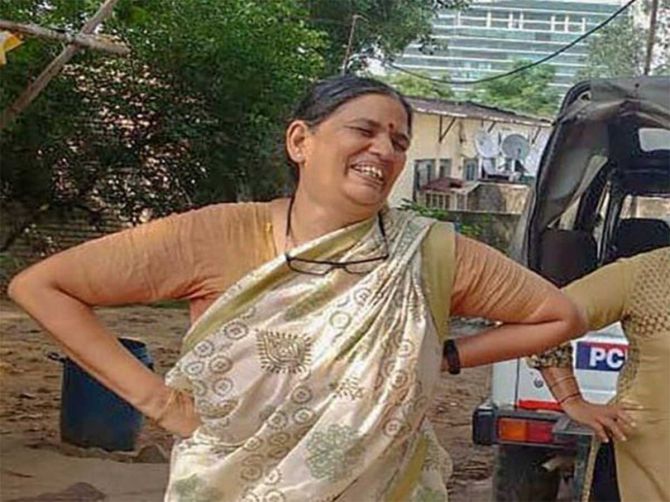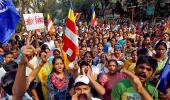'I can't help it if people don't love the minorities, the Dalits and Adivasis; they are as much of this country as any other Indian.'
'If I love them, it does not mean I do not love my country.'
'It is ironic and funny that they have laid such severe anti-national charges against me.'

Good memories. And bad.
Difficult moments. And memorable ones.
Trade union leader, activist and lawyer Sudha Bharadwaj has gathered them all in her challenging walk through Life.
She added to the collection during her three years in jail as an accused in the infamous *Bhima Koregaon case.
And, she tells Rediff.com Senior Contributor Neeta Kolhatkar, she will continue to add to them as she attempts to build a new life in her new karmabhoomi, Mumbai, the city to which she has been restricted as part of her conditional bail (Bharadwaj was released on December 9, 2021).
- PART I: 'I was imprisoned in the phansi yard'
- PART II: 'My greatest strength were prison inmates'
- PART III: 'The State snatched away my time with my daughter'
You used to live in the United States and the United Kingdom. You came to India and dedicated your life to help the marginalised. You have faced difficult times over the years. You have been recently released on bail after being imprisoned for three years. And you still love India?
(Laughs) I got American citizenship by the sheer accident of being born in the United States where my parents were doing their post-doctoral fellowships.
Now that both of them have passed away, I will tell you a secret. I was an accidental baby. They had no intention of having me. In fact, I think my birth put a spanner in their budget.
I came back from America at the age of one and spent some years in India. Then I went with my mother to the United Kingdom. By then, my parents had separated. I lived there till I was 11 years old. My primary schooling took place in England.
What was your mother like? Did you pick up your socialist principles from her?
My mother Krishna Bharadwaj had a Socialist, Marxist, economist background.
She belonged to Karwar (in Karnataka, barely 79 kilometres from Goa), an area influenced both by Socialism and the Goan liberation movement.
She was a good singer when she was a child.
At that time, youngsters would sing these povadas (ballads) as they set off on prabhat pheris (dawn marches that were a subtle form of protest against the British).
Her parents always kept an eye on her because, if she saw anyone singing during the prabhat pheris, she would join them and would have to be brought back from another village.
She was a brave girl; it runs in the family.
When she came back to India, she spent a year or so at the Delhi School of Economics. Then, in 1972, she founded the Centre for Economic Studies and Planning at Delhi's Jawaharlal Nehru University.
My mother was a renowned economist. Neither she nor I had the sense that we were giving up anything by coming to India; it was more of a feeling of returning home.
I do remember that, as our plane neared Delhi's Palam airport, we could see slums. I was horrified and recollect asking my mother, 'Is this how people live here? Let us go back.'
We had returned in the summer. It was hot and I complained a lot. For the first few days, all I wanted to do was go back. I was just a kid (smiles).
Then we moved to the JNU campus and I was happy. It is a beautiful place to live in and I had a really nice childhood there.
It is also an exciting place for politics, far removed from all the violence seen on other campuses. Here, elections are fought through debates, discussions, film shows and plays.
As children, we imbibed all that through osmosis. I saw students getting an education not because they wanted a career because they wanted to do something bigger with their lives. They wanted to change society, which was a much more idealistic notion than just making money.
The night Indira Gandhi lost the election (1977), I remember seeing a mashaal juloos (a procession with fire torches) from our windows.
When Vietnam was liberated (1975), everyone gathered in the quadrangle and sang Surya ast ho gaya, gagan mast ho gaya... and other INA (Subhas Chandra Bose's Indian National Army) songs.
When I went to IIT-Kanpur, I applied as an Indian which was technically wrong as I was still an NRI.
Later, I took up the cause of the mess workers and joined the NSS (National Service Scheme); getting involved with social work came easily and naturally to me.
When I turned 21, I had to decide whether to stay here or go back to the US. I also had to visit the US embassy office to inform them about my whereabouts and renew my visa every six months.
I didn't like the thought of being surveilled by Americans in my own country or being answerable about the work I was doing when I was working among my own people. So I told them I was happy to stay back in India.

Going by the sections you have been arrested under, your work has been termed as anti-national. So your nationalism is not really nationalism?
Aha! Well, I would say it is. It is my love for the people of this country; I can't help it if everyone doesn't love everybody in their country (laughs).
I love workers, but obviously their employers don't love them very much -- they take away their jobs, make them walk home during lockdowns and sometimes ask their security guards to shoot them.
I can't help it if people don't love the minorities, the Dalits and Adivasis; they are as much of this country as any other Indian.
If I love them, it does not mean I do not love my country. It is ironic and funny that they have laid such severe anti-national charges on me.
If these charges weren't so serious, I would have laughed.
This basically means you would have preferred it if I had studied at an IIT, got a degree, gone to the US, got a green card and made a good career for myself and been American; they would have said, 'Oh, we are so proud of Sudha Bharadwaj, she has made such a name for herself.'
There is a beautiful poem about paths diverging and the poet making the choice to take the one less travelled, which makes all the difference (The Road Not Taken by Robert Frost).
I have totally enjoyed taking the path less travelled. If I was faced with these two paths again, I would do the same thing. I have no regrets about my decision. Actually, I am very happy about it.

You have expressed one regret, that you would have loved to spend more time with your daughter. Does it still bother you?
Yes. I only wish I had understood it better.
While I do feel she was a happy child, I have obviously missed out on some of her pain and some of her happy moments.
I feel sorry about this and will try and make it up to her. That is the only anger I have -- that the State deprived me of the little chance I had to spend more time with my daughter.
You did not bother to put me in jail during the 30-odd years that I worked in Chhattisgarh. But when I thought of spending more time with my daughter, that's what you did.
I talk to her regularly now. She studies in Bhilai; she is not well and her exams are on. If I were free, then I would be by her side to look after her. I would not have left her alone. Now, she has to look after herself.
Since I am out on bail, we can at least speak at any time, during the day or night, for as long as we like.
I think she will forgive me when she has her own child and she needs to be forgiven by somebody else.
All of us try our best. Fortunately, the relationship between a parent and child is unconditional.
How has the house-hunting process in Mumbai been? Will you go back to practising law?
I am trying to find a house and should hopefully get one soon.
Societies have their rules; with police verification and other such issues, it becomes tough for anyone to rent their house to someone like me.
I am lucky to have nice and brave friends who have put me up.
I actually like Mumbai. It is efficient and work gets done quickly.
My first impression of Mumbai is yeh kaamkazi logon ka sheher hai (it is a city for working people). I feel confident about finding work here.
Yes, rent is expensive; living in Mumbai is expensive. Again, luckily, my friends are helping me until I find some means to sustain myself.
As for practising the law, it requires a certain infrastructure, books, an office, an Internet connection...
I am thinking of a low-key practice. What I would like to do -- because I have the skills and, more importantly, the urge and passion -- is help the indigent undertrials who are under-represented.
I have received innumerable requests from them before I left the jail.
I would also like to contact trade unions so that I can do work related to labour matters because that is my original love.
I know I will have to brush up and study the new labour laws and court rules.
I will have to find my way (smiles).
That smile, Sudha!
(Laughs heartily) Oh dear! Like the Cheshire Cat (in Lewis Carroll's Alice In Wonderland), this smile is stuck on my face; there's nothing I can do about it (smiles).
I am only giving strength to myself.
There was a meme someone showed me -- of Arnab (Goswami, the head of Republic TV) shouting and snarling eight minutes after he was arrested contrasted with my smiling face after three years in jail.
The case will disappear, but the smile will remain. What else can one do? One can only smile in the face of difficulty and get on with life.
*An event in January 2018 to mark the 200th anniversary of the Battle for Bhima Koregaon turned violent, resulting in one death and five injured.
Please click here to read the complete interview.
Feature Presentation: Ashish Narsale/Rediff.com












 © 2025
© 2025